Al-Zaytouna Centre for Studies and Consultations held a conference at the Crowne Plaza Hotel in Beirut on 11/2/2016, entitled “The Issue of Palestine: Strategic Evaluation 2015 – Strategic Assessment 2016.” It discussed the main developments of the Palestinian issue during 2015, and tried to chart the likely trends that would shape the 2016 Palestinian scene.
The conference comprised three sessions during which a selection of experts, academicians and intellectuals interested in the Palestinian affairs, discussed the developments pertaining to the internal Palestinian scene, the Arab-Israeli scene, and the external forces and environment affecting the Palestinian issue.
Notably, this conference is the eighth in a series of strategic evaluation and assessment seminars held by al-Zaytouna Centre every year to discuss the developments and trends related to the Palestinian issue.
Opening Remarks and First Session
In his opening remarks, Dr. Mohsen Mohammad Saleh, al-Zaytouna General Manager, welcomed the participants and presented an overview of the main topics that would be discussed in the conference.
The first session, moderated by Dr. Saleh, addressed the Palestinian issue through working papers presented by Dr. Mohammad Shtayyeh, Fatah Central Committee member; Dr. Musa Abu Marzuq, Hamas Political Bureau member; Dr. Maher al-Taher, member of the PFLP political bureau and Dr. Mustafa al-Barghouthi, Secretary General of the Palestinian National Initiative.
In the context of addressing the developments of the Palestinian reconciliation and the probable trends, Dr. Shtayyeh mentioned three pivotal issues that are of concern for Fatah: the popular uprising, the reconstruction of relations with Israel and ending the Palestinian division.
Regarding the uprising, Dr. Shtayyeh stressed that the reason for this uprising is not the economic conditions suffered by the Palestinians in the West Bank (WB) –despite the importance of this factor. Rather, what mobilized the Palestinians is the political stalemate and the Israeli practices. Shtayyeh stressed that Fatah 6th conference has supported Palestinian popular resistance.
As for reformulation of the relation with the Israel, Shtayyeh said that a Palestinian delegation intended to meet an Israeli delegation (on Thursday) to inform it of the decision to stop security coordination as Israel continues to violate agreements with the Palestinian Authority (PA).
Concerning ending the Palestinian schism and achieving reconciliation, Shtayyeh reiterated that Fatah needed the conciliation as it was keen on national unity. He added that Fatah could not be subject to any form of blackmail and whoever thinks that Fatah is afraid of the elections could by no means be right. Shtayyeh also stressed the need to reformulate the Palestine Liberation Organization (PLO) as it is the essence of Palestinian legitimacy and the genuine guarantee for the legitimacy of the Palestinian issue.
Dr. Abu Marzuq talked in his presentation about the Palestinian uprising stressing that it has halted the Israeli attempts for spatial and temporal division of al-Aqsa. He also said that the PA is one of the obstacles preventing the expansion of the uprising to all PA territories in the WB.
According to Abu Marzuq, the reconciliation file has witnessed stagnation due to objective reasons while the dialogue sessions in Doha might herald a breakthrough. For the reconciliation to be achieved, Abu Marzuq said that there were essential requirements topped by the need to isolate external pressure as the PLO commitments have brought about the Gaza Strip (GS) blockade and the veto against Hamas. He stressed that the reconciliation decision was in the hands of PA President Mahmud ‘Abbas, who is supposed to be the president of all Palestinians. He also said that there was agreement to present the adoption of popular resistance as a minimum condition on the dialogue table in Doha, and there was preliminary agreement regarding this point.
Abu Marzuq also hailed the PA decision to reformulate the relations with Israel such as security coordination and the Paris Economic Protocol. As for 2016 trends, he suggested that Hamas external relations file with Iran, Kingdom of Saudi Arabia (KSA) and Egypt would witness a breakthrough and remarkable development in the coming days.
Dr. al-Taher addressed the developments of the Palestinian situation and the probable trends in 2016. He said that 2015 was characterized by internal contradictions without yet ending the Palestinian division in addition to lack of vision on different levels. He called for a genuine Palestinian vision and political program while prioritizing the reconciliation and ending the state of division.
Al-Taher said that Oslo Accords was an introduction to undermining the Palestinian situation; thus, there is need to pursue a strategy that would gradually end the Accord. Also, according to al-Taher, there is need to present an alternative and to move on to a new stage without betting on foreign solutions (the U.S, Tony Blair or Jimmy Carter). He also warned against the French initiative.
Dr. al-Barghouthi said that 2015 has witnessed a deepened realization of the failure of Oslo Accords and of the so-called track of peaceful process besides the negative American role. The year also witnessed expanded boycott of Israeli products and the outbreak of the Palestinian uprising in the WB, which expresses new awareness and strong protest against proceeding with the past track.
Al-Barghouthi warned against the appearance of a new group, which embraces the current status quo and is afraid of the uprising. He talked about two scenarios that are likely to crystallize on the Palestinian arena in the coming days, the first of which is stalemate while the other is challenging Israel with the execution of decisions of the Palestinian Central Council and the escalation of the uprising, continued boycott of Israel, a unifying national council and a unified Palestinian leadership. The last scenario demands a change in the balance of power besides escalation in resistance, boycott movement and national unity.
Second Session
The second session was moderated by Mr. Ma‘an Bashour, member of the General Secretariat of the Arab National Conference and its Deputy Secretary General, and it addressed the Arab-Israeli issue. Participants in this session were Mr. Jawad al-Hamad, director of the Middle East Studies Center in Amman; Mr. Hasan Ibhais, a researcher specialized in the Palestinian issue; and Dr. ‘Abbas Isma‘il, Assistant Professor at the Lebanese University and a specialist in the Israeli issue.
Al-Hamad presented a paper on Egypt and the Palestinian issue and the probable developments and trends where he clarified that Egypt has not changed its position regarding Rafah Crossing throughout all Palestinian governments that have been formed after the Agreement on Movement and Access (AMA). He added that Egypt is still dealing with Rafah as a Palestinian-Egyptian crossing but it has other considerations. Thus, said al-Hamad, Cairo is not expected to change its stance on the crossing even if the Palestinian reconciliation agreement was achieved.
As for Egyptian Israeli relations, al-Hamad said that the relations have recently developed on the military and intelligence levels where Tel Aviv allowed Cairo to use weapons prohibited under Camp David Accord against armed groups in Sinai.
Al-Hamad stressed that the multiplicity of regimes that ruled Egypt throughout five years have caused deterioration in Egyptian popular role. As for essential problems marring the Egyptian role in the Palestinian issue, al-Hamad mentioned Egypt’s continued bet on the peace process and pressure exercised by Israel and regional forces urging Cairo to besiege GS. Also, al-Hamad talked about clandestine development between Egypt and the Iranian track in the region in contrast to the tension between Hamas and Iran. For future trends, al-Hamad opined that chances for change in favor of the Palestinian issue would increase the positivity of the Egyptian stance towards the issue.
Mr. Ibhais’ presentation addressed the Arab world and the Palestinian issue and probable developments and tracks on this level. He said that strategic transformations in the region during 2014 and 2015 do not seem to be in favor of the Palestinian issue in the foreseeable and medium term future. The Palestinian issue has deteriorated among Arab, and even regional and international priorities for other files whose influence would continue to be of major concern for different sides for the coming one or two years at least, as per Ibhais.
At the same time, according to Ibhais, the most significant positive aspect that could be traced is that the Palestinian issue is still able to form one of the important points of agreement among the conflicting parties in the region and that it is still present as one of the Arab peoples’ concerns. According to Ibhais, that was clear during the Israeli aggression on al-Aqsa Mosque and in response to schemes of temporal and spatial division targeting the Mosque as well as the Israeli aggression on GS in summer 2014.
In his paper concerning Israel and the Palestinian issue and the possible developments and tracks, Dr. Isma‘il stated that two important developments have affected the Israeli approach to the Palestinian issue in 2015 and they would also be effective in determining the trends in 2016. These developments are the Knesset elections that led to a new government and the outbreak of the Palestinian uprising.
Isma‘il added that the success of Likud Party leader Benjamin Netanyahu in achieving major victory in the 20th Knesset elections has allowed him to form his 4th government which was purely Rightist thus ruling out any chance for political settlement with the PA. This development, in addition to the continuation of occupation and settlement construction, has led to the outbreak of the Jerusalem Intifada, according to Isma‘il.
In a brief summary of the uprising, Isma‘il asserted that it was possible to trace the state of confusion, contradiction and loss that characterized the Israeli approach to the Palestinian uprising and the means of its confrontation.
He also expected that the state of confusion, disagreement and anxiety that prevailed on the Israeli scene in the last months of 2015 as a result of the uprising might develop in stronger and more complicated pace in 2016. This is so, according to Isma‘il, as the causes behind the uprising remain intact added to the lack of popular comfort regarding the development of conditions in the foreseeable future, which would lead to more escalation and complication.
Third Session
The third session, which was moderated by Dr. Nahla al-Shahhal, coordinator of the International Civil Campaign for the Protection of the Palestinian People, tackled the Islamic and International arena affecting the Palestinian issue. This session was held with the participation of Dr. Talal ‘Atrissi, professor of Sociology of Education and Social Psychology at the Lebanese University; Dr. Sa‘id el-Hajj, a specialist in the Turkish issue and member of the Union of Palestinian Poets and Authors; and Dr. Magdi Hammad, President of the Lebanese International University in Beirut and former head of the PLO Planning Department.
Dr. ‘Atrissi stressed in his paper on Iran and the Palestinian issue that the outbreak of the “knives uprising” before the end of 2015 has cast light again on the developments in Palestine. He explained that the Islamic world’s concern was deviated from the Palestinian issue throughout 2014-2015 with the crises witnessed in a number of Arab countries a few years ago such as Libya, Bahrain, Syria, Yemen and Iraq.
‘Atrissi reiterated that the Palestinian issue is still a major concern in Iranian foreign policy where Iran considers it a constant towards which it has not changed its policy during any stage. Further, the nuclear deal with the West has not and would not change Tehran’s concern with the Palestinian issue which is a “sacred issue” for Iran.
As for the relation between Iran and Hamas, ‘Atrissi said that debate and talks continued after the distantness in this relation following the Syrian crisis. He noted that the two sides were keen on confirming that there was no rupture in the relations where 2015 witnessed relative development on this level after two Hamas delegates’ visits to Tehran. However, this improvement was not interpreted in restoring relations of coordination and support. ‘Atrissi emphasized that past years’ experience between Hamas and Iran showed that it would be difficult to cut relations between the two sides due to the strategic goals common to the two sides in terms of facing Israel.
‘Atrissi concluded his presentation stressing that, in light of Israeli threats to wage a war under the pretext of GS tunnels, it would be a priority to maintain the relation between the resistance movement in Palestine and Iran, which still adheres to the constants of this issue. Yet, ‘Atrissi said, this should not necessarily come at the expense of the relation with any other regional force which might participate to the support of the same issue.
Dr. Sa‘id el-Hajj talked about the relation between Turkey and the Palestinian issue and the developments and probable trends. He said that Turkey’s policy is based on not trespassing Arab-international limits in dealing with the Palestinian issue while committing to the political track based on the Two-State Solution and the Arab Peace Initiative. Additionally, Turkey’s policy does not exceed the limits of political–media–financial support for Palestinian factions. El-Haj added that there was a major transformation in Ankara’s stance in terms of action and influence in 2015 where the Turkish interaction with the popular uprising was less than the interaction witnessed during the Israeli assault on GS in 2014. This, as el-Hajj explained, was because the uprising has started amidst the transition phase in Turkey, which was busy with legislative elections.
El-Hajj said that after five and half years of diplomatic boycott between Turkey and Israel, there was a gradual lull in political address between the two sides since June 2015 while negotiations were restored to normalize relations with Ankara holding on to its condition to break the GS blockade. However, the developments in the Syrian crisis and the escalation with Kurdistan Workers’ Party (PKK) were a major concern for Turkey in the second half of 2015 where they are expected to remain at top priority in 2016.
Hammad’s paper tackled the international impact, especially American impact on the Palestinian issue and its possible trends pointing out to the continued American position towards the settlement issue, particularly the rejection of the establishment of the Palestinian State in principle and of the Palestinian reconciliation. He said that Obama was practically becoming a “lame duck” in the remaining period of his tenure after the beginning of the 2016 presidential race.
As for the American approach to the recognition of the Palestinian State in the Security Council (SC) and in light of the Obama Administration’s announcement that it was reassessing its policy vis-à-vis Israel after Netanyahu’s declaration that he was giving up on commitment to the Palestinian State, Hammad outlined three scenarios. The first is for Washington to give up on the reassessment and stick to the warning by Obama in return for Netanyahu’s commitment to the Palestinian State. The second scenario is for Obama to execute his threat and agree to the issuance of a SC resolution recognizing the Palestinian State while the third scenario is for the American Administration to allow a European recognition of the Palestinian State without obstructing sanctions Europe has threatened to impose on Israel while watching as their influence would crystallize.
Hammad also tackled the French initiative and Paris’ promise to recognize the Palestinian State in case of its failure. He stated that the development of the initiative and defining its prospects depend primarily on the American standing towards it.
Final Remarks
At the end of the conference, Dr. Saleh thanked the participants and audience commending the presentations and discussion hoping that the conference would participate to serving the Palestinian issue and the sides working towards its resolution.
Saleh said that we were living in a historic condition as the region is being reshaped and thus we need a state of awareness. He also stressed the need for everyone to bear responsibility and work to reestablish a genuine Palestinian national project.
Al-Najah National University students watching the conference via livestream



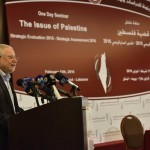
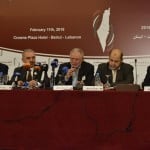
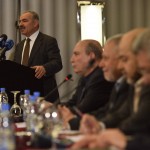
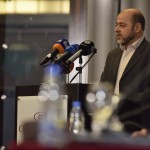
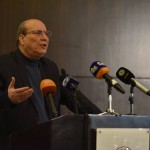
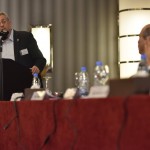
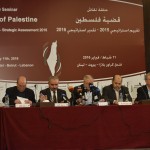
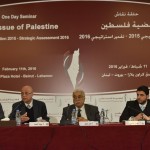
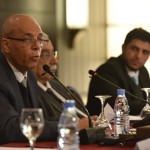
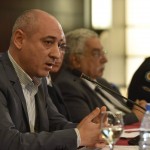
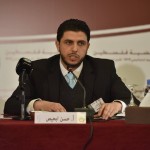
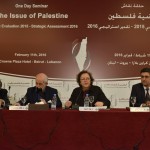
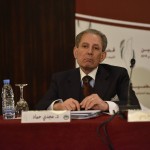
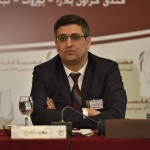
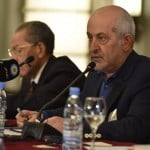
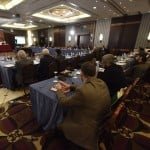
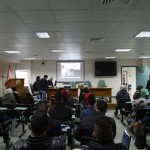
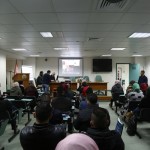
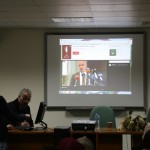
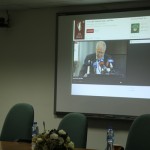

Leave A Comment